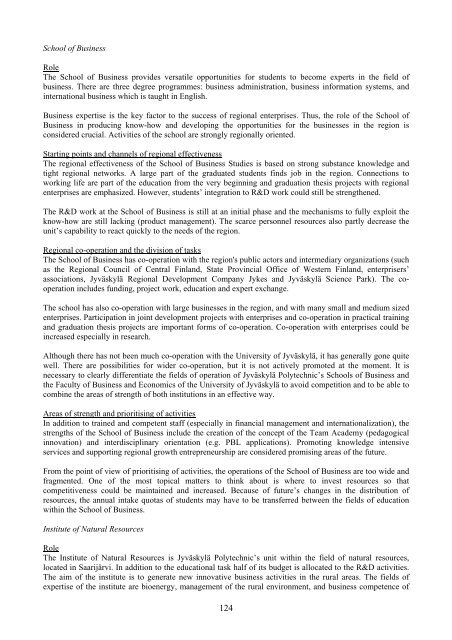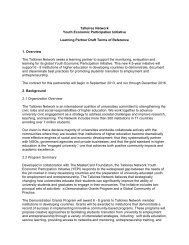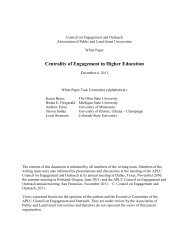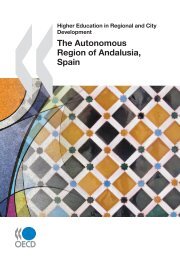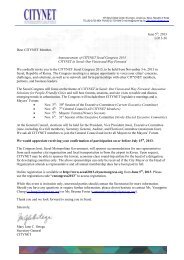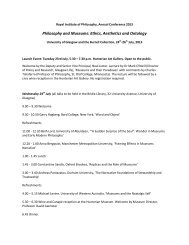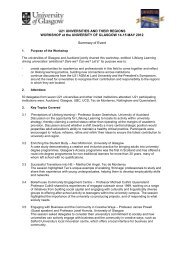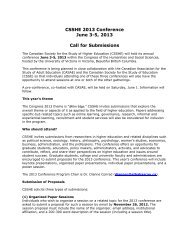Finland - Jyvaskyla Region - Final Self-Evaluation Report.pdf
Finland - Jyvaskyla Region - Final Self-Evaluation Report.pdf
Finland - Jyvaskyla Region - Final Self-Evaluation Report.pdf
You also want an ePaper? Increase the reach of your titles
YUMPU automatically turns print PDFs into web optimized ePapers that Google loves.
School of BusinessRoleThe School of Business provides versatile opportunities for students to become experts in the field ofbusiness. There are three degree programmes: business administration, business information systems, andinternational business which is taught in English.Business expertise is the key factor to the success of regional enterprises. Thus, the role of the School ofBusiness in producing know-how and developing the opportunities for the businesses in the region isconsidered crucial. Activities of the school are strongly regionally oriented.Starting points and channels of regional effectivenessThe regional effectiveness of the School of Business Studies is based on strong substance knowledge andtight regional networks. A large part of the graduated students finds job in the region. Connections toworking life are part of the education from the very beginning and graduation thesis projects with regionalenterprises are emphasized. However, students’ integration to R&D work could still be strengthened.The R&D work at the School of Business is still at an initial phase and the mechanisms to fully exploit theknow-how are still lacking (product management). The scarce personnel resources also partly decrease theunit’s capability to react quickly to the needs of the region.<strong>Region</strong>al co-operation and the division of tasksThe School of Business has co-operation with the region's public actors and intermediary organizations (suchas the <strong>Region</strong>al Council of Central <strong>Finland</strong>, State Provincial Office of Western <strong>Finland</strong>, enterprisers’associations, Jyväskylä <strong>Region</strong>al Development Company Jykes and Jyväskylä Science Park). The cooperationincludes funding, project work, education and expert exchange.The school has also co-operation with large businesses in the region, and with many small and medium sizedenterprises. Participation in joint development projects with enterprises and co-operation in practical trainingand graduation thesis projects are important forms of co-operation. Co-operation with enterprises could beincreased especially in research.Although there has not been much co-operation with the University of Jyväskylä, it has generally gone quitewell. There are possibilities for wider co-operation, but it is not actively promoted at the moment. It isnecessary to clearly differentiate the fields of operation of Jyväskylä Polytechnic’s Schools of Business andthe Faculty of Business and Economics of the University of Jyväskylä to avoid competition and to be able tocombine the areas of strength of both institutions in an effective way.Areas of strength and prioritising of activitiesIn addition to trained and competent staff (especially in financial management and internationalization), thestrengths of the School of Business include the creation of the concept of the Team Academy (pedagogicalinnovation) and interdisciplinary orientation (e.g. PBL applications). Promoting knowledge intensiveservices and supporting regional growth entrepreneurship are considered promising areas of the future.From the point of view of prioritising of activities, the operations of the School of Business are too wide andfragmented. One of the most topical matters to think about is where to invest resources so thatcompetitiveness could be maintained and increased. Because of future’s changes in the distribution ofresources, the annual intake quotas of students may have to be transferred between the fields of educationwithin the School of Business.Institute of Natural ResourcesRoleThe Institute of Natural Resources is Jyväskylä Polytechnic’s unit within the field of natural resources,located in Saarijärvi. In addition to the educational task half of its budget is allocated to the R&D activities.The aim of the institute is to generate new innovative business activities in the rural areas. The fields ofexpertise of the institute are bioenergy, management of the rural environment, and business competence of124


